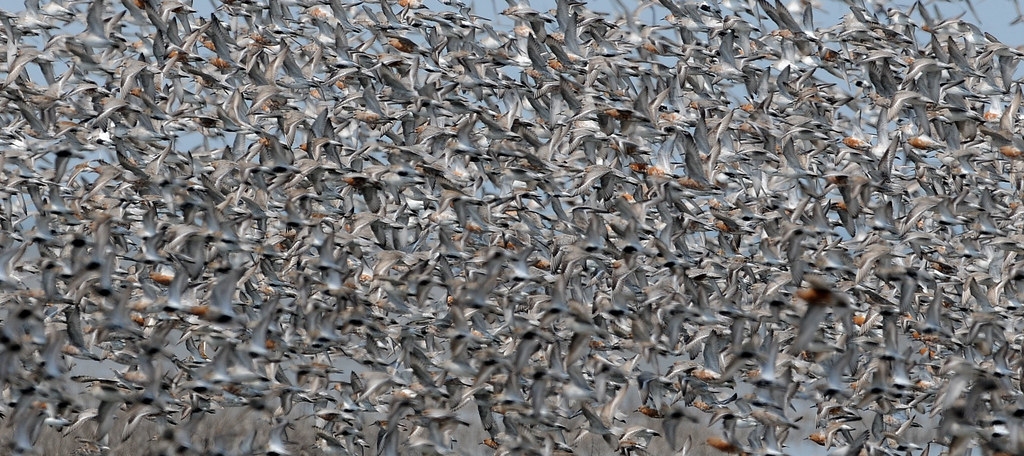A Wader Mass Brian Rafferty
Not the subject of the post, but a mass of waders in flight to black out the skies like this is a sight to blow your socks off - you really do have to 'clik the pik' this time for the full effect - and this would be just a fragment of the birds in BR's view when he took this image.
The status of the Sanderling in Lancashire is of an abundant passage migrant and common winter visitor, not so in our recording area in the north where it is seen as a spring passage migrant, much rarer in the autumn, and a very rare winter visitor.
Having found eight Sanderling on Plover Scar at Cockersands on Thursday last week, I spent some time checking through c.600 other waders on here at the time, but also pondered especially on the Sanderling and the migration they were undertaking, though some winter in the UK. I never fail to be fascinated at the epic journeys some birds make on migration, whilst wondering why they do it and with all the hazards involved too.
In order for a bird to travel successfully between two places on migration it must first make preparations by storing fat as fuel for the journey ahead. It then has to choose the right time of year and weather conditions for its departure. On lengthy flights it needs to stop to refuel, in a young bird this is going to be at a site it has never seen before, in which case the likelyhood is that it holds food nothing like the food it found around its birthplace. I found myself wondering, when these birds reach the end of their epic journey, how do they know they've arrived at the destination they set out to get to in the first place.
Eleonora's Falcon Martin Lofgren
Many migrant birds can be blown off course by winds and storms, whatever navigational systems it may have in place will be lost in situations like this, it can run out of fuel when over the sea, it may find a refuelling site devoid of food, or it may be attacked by a bird of prey like the Eleonora's Falcon which makes its living out of migrant birds particularly song birds.
Amazing isn't it, that millions of birds migrate successfully over vast distances year on year. I can't watch birds like the Sanderling which I found at Cockersands and then just simply move on, these birds are migrating and I have to ponder, where have they come from, where are they going, and why....its all a part of the interest I have for the birds I see.
Thanks to Brian and Martin for the waders and the falcon, much appreciated.


Brian's 'Wader Mass' is fabulous!!
ReplyDelete